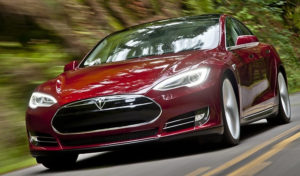
According to Tesla, the Model S all-electric car is one of the fastest sedans in the world. Photo | Tesla, U.S. Department of Energy
Tesla gained “an Exxon,” or about $260 billion in market capitalization even after rumors of an agreement with Hertz were debunked by CEO Elon Musk. Bloomberg’s Liam Denning writes:
For automakers, fleet sales used to be like the free newspapers lying around hotel lobbies. You shifted product, yes, but not in a way any half-sentient investor would value.
As with so much else, Elon Musk has apparently changed all that.
Shares of car rental giants Hertz Global Holdings Inc. and, especially, Avis Budget Group Inc. have soared this past week or so on news that they are buying a lot of electric vehicles or planning to. That’s it. Tesla Inc. also raced above a $1 trillion valuation after Hertz said it would buy 100,000 Muskmobiles. And even after Musk tweeted some cold water by pointing out no contract had been signed with Hertz, causing Tesla’s stock to retreat, its market cap was still higher than
when the original news broke by about $260 billion — or, as I like to think of it, roughly an Exxon.Far from being an embarrassment, therefore, fleet sales are now a fantastic, self-funding business model all their own. Rent-a-Car Corp. simply announces it will/might buy thousands of EVs. Previously deemed a “cost,” this is now actually a ticket to meme-hood. Once that’s fed through to the stock price, all
that remains is for Rent-a-Car to take investors at their word and give them more of what they want: new stock. Thus, with funding secured, Rent-a-Car can actually afford to buy all those shiny new EVs. Or not, but they’ll probably buy some.The perpetual-motionish aspect is all a bit laughable, sure. But all these stocks are actually a lot higher than they were before these announcements and half-intentions got out there, so there’s that reality to contend with.
